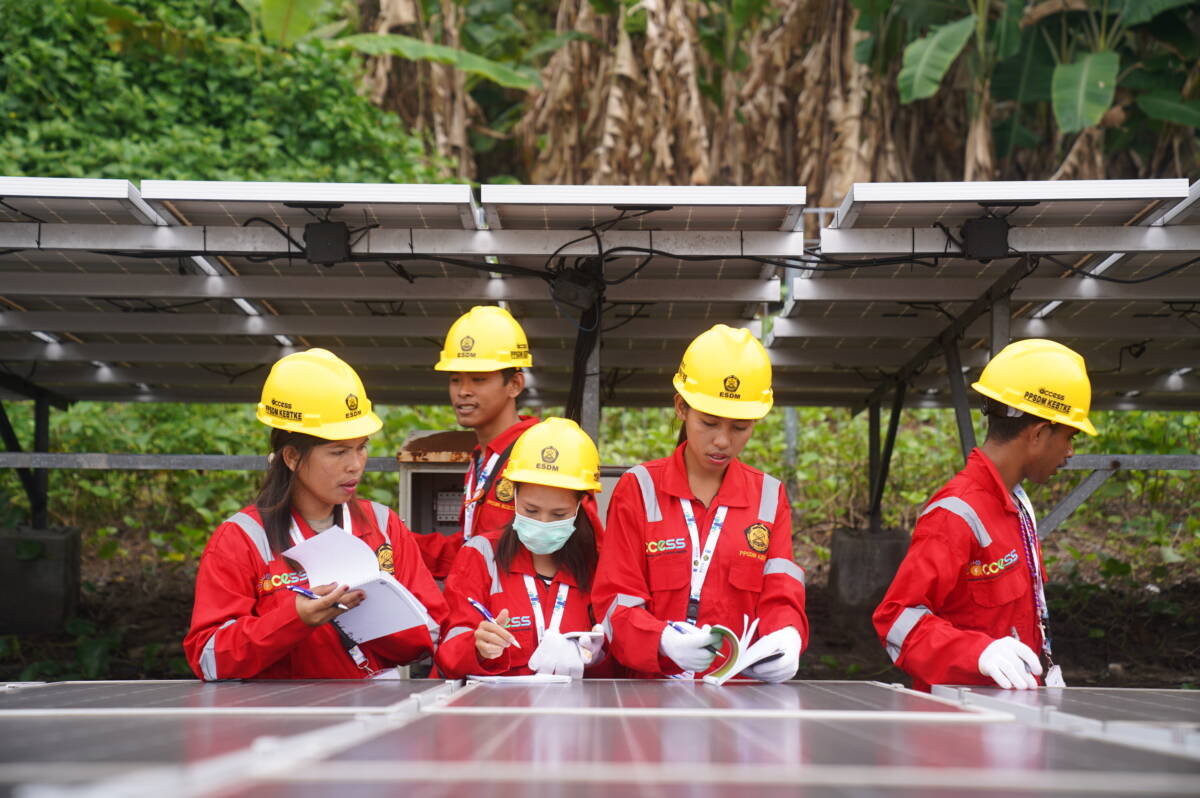Navigating the socio-economic impact is one of the challenges in Indonesia’s energy transition agenda, due to the huge contribution of the current energy system to the national economy and societal structure. Indonesia’s economy has long been intertwined with the fossil fuel industry, as oil, gas, and coal serving as primary energy sources and substantial contributors to GDP, state revenues, employment, and the livelihoods of communities in coal-producing areas (MEMR 2019; IESR, 2023). Transitioning to renewable energy sources without causing economic and social disruptions presents a significant challenge for major coal-producing countries like Indonesia.
However, the energy transition not only presents challenges but also opportunities because of the potential creation of new jobs and projected net job gains. The ILO estimated that around 6 million jobs may be lost by 2030 due to the transition to a green economy, but around 24 million new jobs are forecasted to be created worldwide (ILO, 2018a). Nationally, new jobs are expected to reach between 2.1 million and 3.7 million direct jobs in renewables by 2030, with up to 0.5 additional indirect jobs created in other sectors of the economy that supply goods and services to the renewable energy sectors in Indonesia (GGGI, 2020). To fully harness these job creation opportunities, it is crucial to identify challenges in employment during the transition to further develop suitable strategies.
What challenges exist regarding employment in energy transition?
Firstly, the issue of the skill gap or mismatch among the workforce. While the country has a sufficient number of workers for the electricity sector over the medium or long term, there still exists a lack of skills to match the core competencies needed to adapt to new demands and technological developments, such as project development, system design and planning, construction and implementation, testing and commissioning, and operation and maintenance skills (ADB, 2021). Other sectors besides the electricity sector, such as automotive industry, transportation, fisheries, have received less attention regarding their potential contribution to the green economy, leading to unidentified skill demands and supplies (ILO, 2018b). In general, there are four identified skills important for green jobs: engineering and technical, science, operation management, and monitoring skills, which are also provided in training platforms or programs (Prakerja, 2024). Nevertheless, the specific needs of employment in energy transition at both the national and local scales are still unidentified.
Second, the sudden job losses leading to livelihood disruption, especially in coal-producing areas. The energy transition is estimated to result in layoffs of around 30,000 mining workers in Indonesia between 2020 to 2040 (Global Energy Monitor, 2023), causing economic hardship and social disruption within the affected communities. Mitigating this challenge requires comprehensive transition policies that provide support for affected workers, including retraining programs, job placement assistance, and financial support (ILO, 2018a).
Third, the lack of stable enabling regulation for human capital development in energy transition. Developing stable and enabling regulations is essential to facilitate the transition to a skilled and adaptable workforce capable of driving the renewable energy transition (World Bank, 2018). An absence of a national integrated framework for anticipating green jobs in different sectors and a lack of manpower policies on skills development for green jobs is still a big gap to enable Indonesia’s workforce to prepare for the energy transition (ILO, 2018b).
What needs to be done by the government?
Indonesia has regulations addressing employment and community impacts during energy transition. For instance, the incorporation of the net-zero target into the National Long-term Development Plan 2025–2045 can guide development planning alongside the decarbonization agenda, provided it is implemented effectively. Additionally, there are employment regulations supporting impact mitigation, such as: 1) Law No. 13 of 2003 and Perppu No. 2 of 2022 ensure social protection by guaranteeing the right to severance pay; 2) the National Job Training System (Sistem Pelatihan Kerja Nasional or Sislatkernas), established by PP No. 31 of 2006, to supports the development of skills for new jobs; and 3) recent regulations are starting to embrace the principle of meaningful participation in the formation of laws and regulations at every level, facilitating social dialogue and community participation (PSHK, 2023). Even with the supportive regulation, effective implementation through operational policies and project-level guidance is needed.
Operational policies and guidance should be integrated into Indonesia’s national employment roadmap for the energy transition. Given the current lack of such a roadmap, its development needs to be expedited to ensure that guidelines are tailored to local contexts. The Ministry of Manpower should lead the identification of employment needs and gaps in collaboration with Bappenas at the national level and with other relevant ministries at the sectoral level (ILO, 2018b). Upon completion of the roadmap, a holistic strategy to mainstream it must be implemented across all government bodies under the coordination of the Ministry of Manpower.

